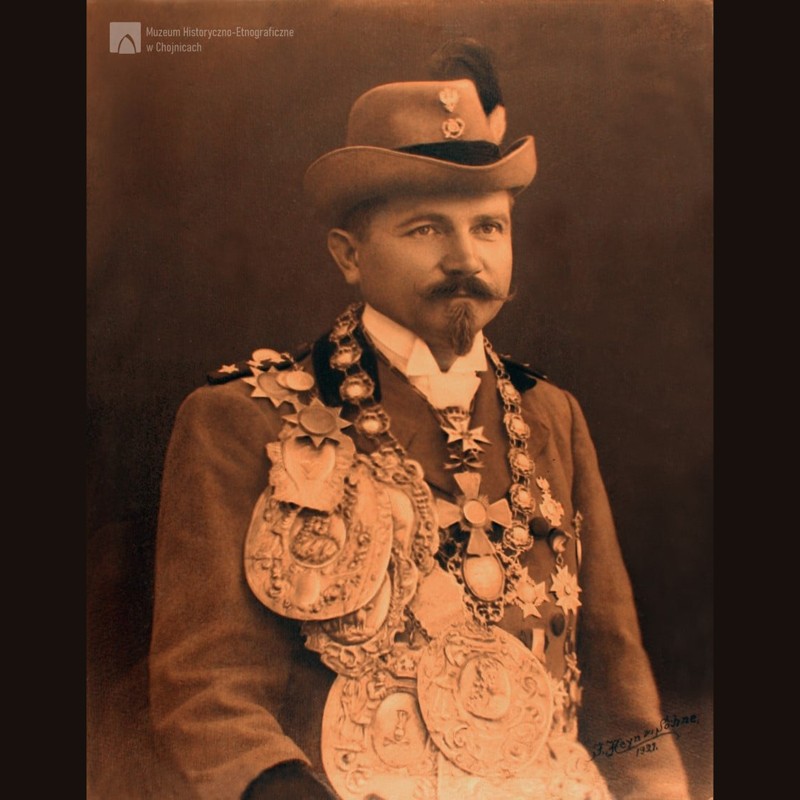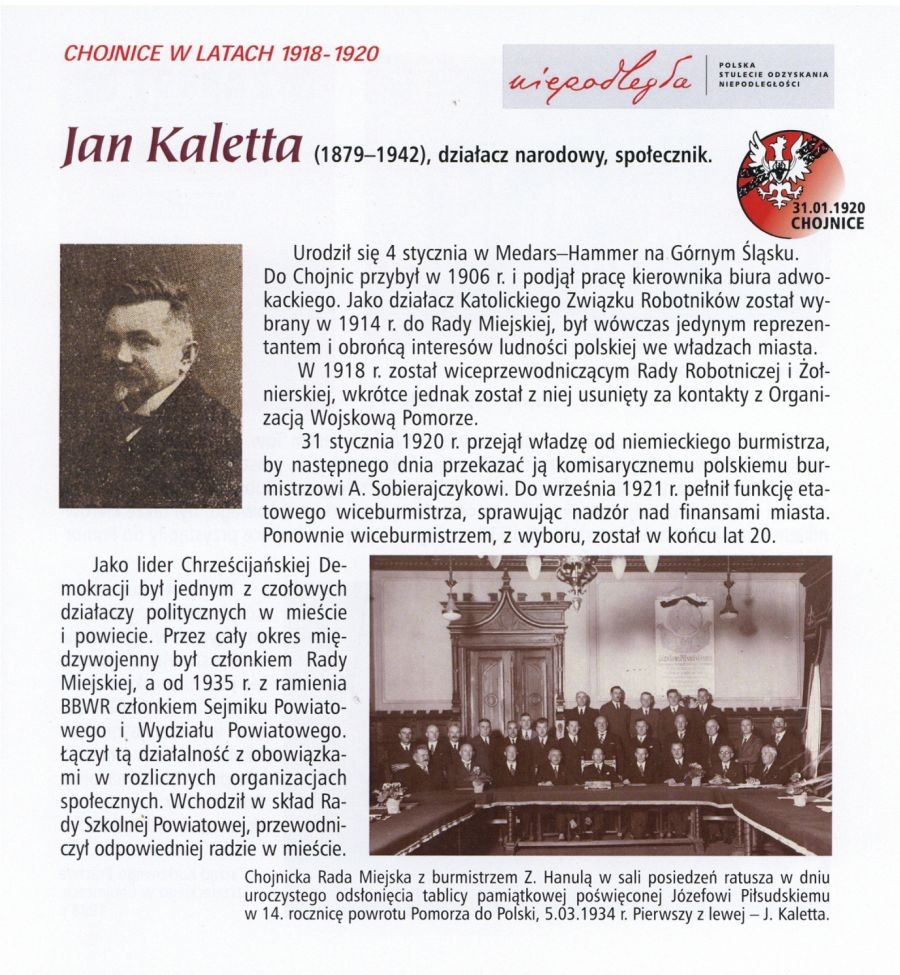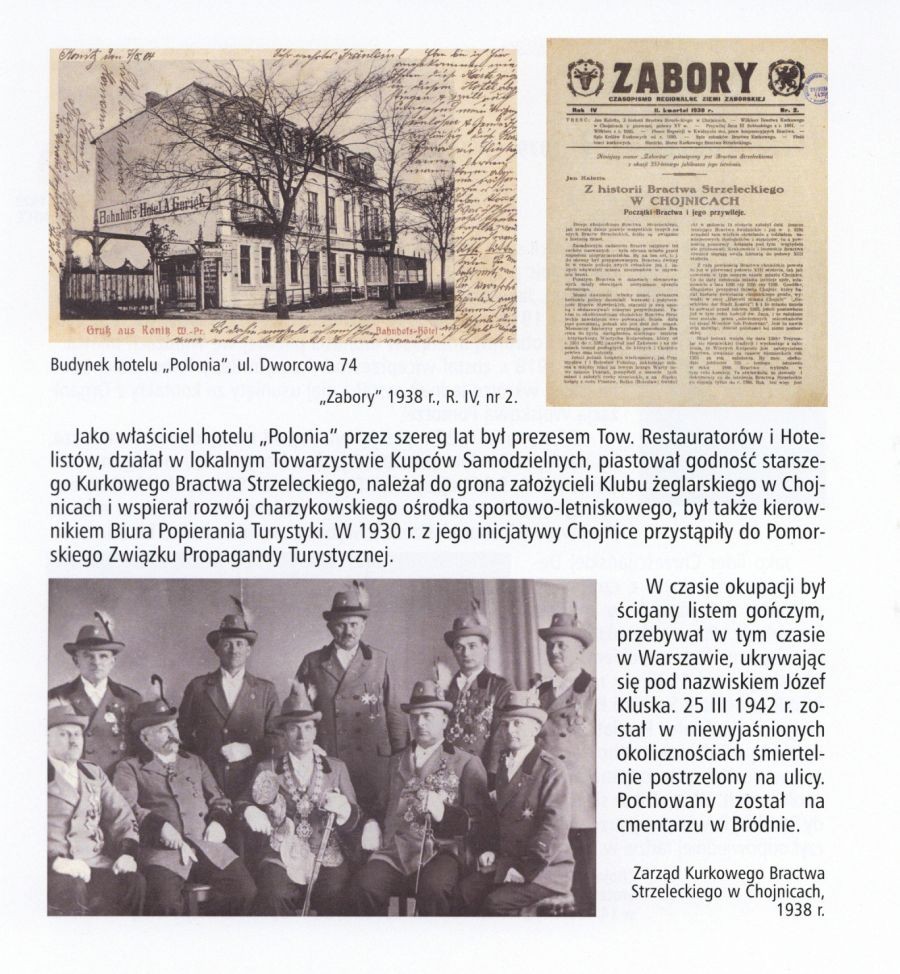
Jan Kaletta (1879-1942), independence activist, local government officer, social activist
At the beginning of the 20th century there was a revival of national life in Chojnice. In the last years before the outbreak of the First World War, the percentage of Poles increased to such an extent that more and more accents appeared in Polish public life. This process was initiated by the intelligentsia, and among them Jan Kaletta stood out actively. He was born on 4 January 1879 in Medars - Hammer in Upper Silesia. He arrived in Chojnice in 1906 and took up a job as manager of a lawyer's office. As an activist of the Catholic Workers' Union, he was elected to the Town Council in 1914. At that time he was the only representative of the Polish population, whose rights and interests he courageously defended within the structures of the municipal authorities. In 1918, he became vice-chairman of the Workers‘ and Soldiers’ Council, but was soon removed from it for his contacts with the Pomeranian Military Organisation.
On 31 January 1920, he took over from the German mayor, and the following day handed over to the Polish commissioner mayor Alojzy Sobierajczyk (1870 - 1934). He served as full-time vice-mayor until September 1921, overseeing the city's finances, and was again elected mayor in the late 1920s.
As a leader of the Christian Democracy, he was one of the leading political activists in the town and district. Throughout the inter-war period he was a member of the Town Council, and from 1935, on behalf of the BBWR, a member of the County Assembly and the County Department. Kaletta was active in numerous social organisations. He was a member of the County School Board and chaired the corresponding council in the town.
As the owner of the Hotel ‘Polonia’, he was president of the Association of Restaurants and Hoteliers for many years. His establishment, located in an excellent spot next to the town hall, was a prestigious venue for social gatherings, balls, entertainment events and family celebrations. The ‘Polonia’ Restaurant catered for, among other things, official receptions in the halls of the Town Hall during the visits of Presidents: Stanisław Wojciechowski on 6 August 1924 and Ignacy Mościcki on 6 August 1927. Kaletta was also active in the local Society of Independent Merchants. He held the title of elder of the Bursar's Shooting Fraternity. Founded in the 14th century, the paramilitary civic organisation in former times was intended to defend the city against threats from enemies. In the new reality, it continued its rich traditions and ceremonial. It can be described as bringing together wealthy bourgeoisie with an elite character. During the visit of President Stanisław Wojciechowski in 1924, the Chojnice Brotherhood solemnly consecrated its new banner. Jan Kaletta was elected the first Polish president of the Brotherhood after the restoration of independence in December 1920 and held this position until 1939. In the inter-war period he won the dignity of King of the Chancery three times in shooting competitions. His commitment and outstanding organisational skills led to Kaletta's appointment in 1927 to the Board of Directors of the Union of Shooting Fraternities of the Republic of Poland.
He was also the head of the Municipal Office for the Promotion of Tourism, set up on the initiative of Mayor Alojzy Sobierajczyk and based in the Town Hall. For this reason he strove to popularise Chojnice and the Charzykowy summer resort in the regional and national press. Kaletta himself was a great lover of water sports, he was one of the founders of the Sailing Club in Chojnice and supported it financially. In 1930, on his initiative, Chojnice joined the Pomeranian Association of Tourist Propaganda.
During the occupation, he was prosecuted with a letter of appointment. He stayed in Warsaw at the time, hiding under the name Józef Kluska. Thanks to this, he avoided arrest and execution

